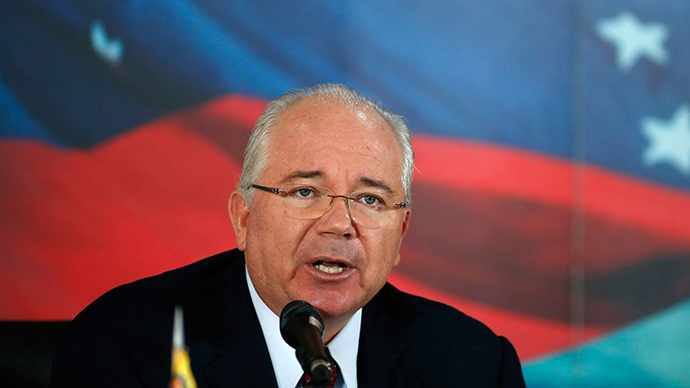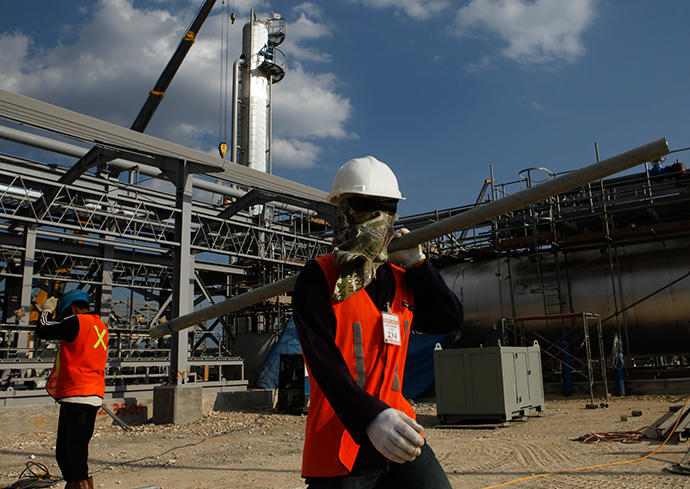Venezuela’s game with the devil

If Nicolas Maduro, President of Venezuela, decides to pay ExxonMobil $1.6bn in compensation for the nationalization of an oil project that will be almost a business deal with the devil, and Venezuela will only lose.
Who does not remember the late Venezuelan President Hugo Chavez calling George W Bush “the devil” in front of the United Nations in September 2006? Or, how he told former British Prime Minister Tony Blair “Go straight to hell, Mr. Blair”? These moments gave us a glimpse of what Venezuela was trying to do, that they meant business with the “Evil Empire.” But eighteen months after Chavez’s death, his heirs appear to be playing games with the devil.
Last week, the World Bank arbitration tribunal ruled that Venezuela must pay $1.6bn to ExxonMobil in compensations. Chavez’s anti-imperialist and populist rhetoric was quickly replaced with more sober words. Foreign Minister Rafael Ramirez called this ruling a “victory to sovereignty.” Yes, the sum is peanuts compared to Exxon’s initial claims of nearly $12bn. But it is playing a dangerous game. The price is high if it finally decides to compensate ExxonMobil, handing back power to those opposed to the Bolivarian revolution.
In 2007, Chavez and his government nationalized ExxonMobil’s Cerro Negro Project and other assets. Since then, the company has been seeking compensations of up to $16.6bn. A previous decision in 2012 ruled that Venezuela’s national oil company, PDVSA should pay Exxon $908m. With the aid of international courts, ExxonMobil froze $300m of Venezuela’s money held in US accounts.
ExxonMobil was anything but satisfied. So it came looking for more. After all, ExxonMobil needs to assure investors that its money is safe. This it failed to do. ExxonMobil’s stock fell by three per cent on Wall Street last week. Yet, this will only worry shareholders in the short-term. If money talks the stock markets scream. Exxon’s gamble did not pay. But with Chavez gone, it was a risk worth taking.
For Venezuela however “a victory to sovereignty” looks different. It would have seen ExxonMobil leave Venezuela empty-handed, and the Venezuelan government pledge to use the $1.6bn for social, educational or environmental programs. This could deepen the Bolivarian process and strengthen the hand of Venezuela against US-run multi-national companies. However, Ramirez’s rhetoric mirrors Venezuelan reality post-Chavez.

Venezuela has handed over more power to US oil than it would like to admit. In order to boost productivity and output, it agreed to a $2bn financing deal with multinational oil company Chevron. It leaves a bitter taste. But more so, it opens the door to those seeking shareholder value.
Recent loan agreements with multi-national oil companies have all contained unfavorable investor protection clauses. The future price could be a high one if Venezuela cannot fulfill the terms and conditions set out. Are these games with the devil really worth it?
Venezuela is not broke. After all, the PDVSA continues to produce 2.5 million barrels of oil per day. However, Venezuela’s national sovereignty is tied up with oil like nowhere else in the world. It remains the fourth largest oil exporter to the United States. But its source of strength is also its Achilles Heel. A large part of its recent earnings flow to China as loan repayments. With 95 per cent of the country’s export income generated through oil, negotiation and conciliation are required to soothe international finance and capital markets.
In fact, Venezuela’s nationalization strategy was never as aggressive as the Western media would like us to think. As George Ciccariello-Maher, author of We Created Chavez, told me: “The government argues that this is a victory against Exxon's outrageous claims. But this is because the Venezuelan process has always been very strategic in insisting that all expropriations would be compensated. This will no doubt prove less than convincing for radical sectors which reject capitalist valuation entirely.”
More than ever, Venezuela needs a strategy to deal with the demands for compensation. Currently Venezuela faces 20 pending claims for compensation. Paying up will only weaken it. Negotiation will have them looking for more. It is a vicious cycle very difficult to escape. Mining company Gold Reserve won $740 million.

If Venezuela pays Exxon, it could quickly unravel. Following last week’s ruling we can be certain that Conoco Phillips will be granted a similar amount at an arbitration court. If the court however decides to grant them significantly more, it is likely that ExxonMobil would use preferential treatment clauses to unleash its lawyers like a gang of rabid dogs, possibly costing Venezuela many more billions. After all, The World Bank’s International Centre for Settlement of Investor Disputes (ICSID) does not mediate between disputing parties; it acts in the interests of those who want to drive Venezuelans into further immiseration.
Since the 1990s, we have seen a significant rise of investor state attacks on domestic regulatory policy with more than 95 countries having to respond to one or more investment arbitration cases. Self-evidently, countries like Venezuela, Argentina, Bolivia and Ecuador who turned their backs on neoliberalism bore the brunt of this clause. With the on-going economic crisis and shifts in the political landscape, there were 58 new cases in 2012 alone according to UNCTAD. With Chavez gone, multi-nationals hope to make a quick buck.
The Venezuelan government carries a responsibility for other countries in the Global South. It should condemn these investor protection clauses and arbitration courts forcing countries to submit to the Washington consensus and neoliberal paradigm. Venezuela and others stand with no obligation to pay up. After all, it was companies like ExxonMobil and Gold Reserve which ransacked Venezuela for its natural resources, causing irreversible ecological and economic damage which it still suffers today.
Playing games with the devil might solve cash-flow problems in the short-term. But once you open Pandora’s Box these multi-national companies will just eye for more. Even Chavez’s rhetoric cannot help them now. It will require action. Let us hope Maduro and Ramirez step up to the game.
The statements, views and opinions expressed in this column are solely those of the author and do not necessarily represent those of RT.
The statements, views and opinions expressed in this column are solely those of the author and do not necessarily represent those of RT.













